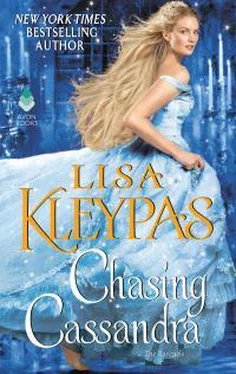The so-called heroine, Anne Elliot, who’d been persuaded by her family to end her engagement to Captain Wentworth, was appallingly passive and restrained. Wentworth, for his part, was understandably aloof.
Tom had to admit, however, that he’d felt a few moments of kinship with Anne, who had such trouble identifying and expressing her feelings. He understood that all too well.
And then he reached the part where Wentworth poured out his emotions in a love letter: You pierce my soul. I am half agony, half hope. For some reason, Tom had felt a genuine sense of relief when Anne discovered the letter and realized Wentworth still loved her. But how could Tom experience a real feeling about someone who’d never existed, and events that had never happened? The question left him puzzled and fascinated.
The deeper meaning of the novel, however, had remained a mystery. As far as Tom could tell, the point of Persuasion was never to let relatives interfere with one’s engagement.
Soon, however, Tom found himself returning to the bookshop and asking the bookseller for recommendations. He returned home with Don Quixote , Les Misérables , and A Tale of Two Cities , although he wasn’t sure why he was compelled to read them. Maybe it was the sense they all contained clues to an elusive secret. Maybe if he read enough novels about the problems of fictional people, he might find some clue about how to solve his own.
“Bazzle,” Tom said absently as he read contracts at his desk, “stop that infernal scratching.”
“Yes, sir,” came the dutiful reply. The boy continued sweeping around the edge of the office with a broom and dustpan.
There was much about Bazzle that Tom had come to appreciate during the past few weeks. It wasn’t that the boy was particularly intelligent—he was uneducated and knew only enough math to count small currency. Nor was Bazzle a handsome lad, with his short jaw and slum-pallor complexion. But the boy’s character was solid gold, which was miraculous for anyone who’d come from dangerous and disease-ridden slums.
Life hadn’t been kind to Bazzle, but he took each day as it was and maintained a sort of dogged cheerfulness that Tom liked. The boy was never late, sick, or dishonest. He wouldn’t take so much as a crust of bread if he thought it belonged to someone else. More than once, Tom’s assistant Barnaby had dashed off harum-scarum on some errand, and left the remains of his lunch—a half sandwich, or a hand pie, or a few scraps of bread and cheese—lying unwrapped on his desk. Tom found the habit supremely annoying, since uneaten food tended to attract vermin. He’d hated insects and rodents ever since his days working as a train boy, when the only room he’d been able to afford had been a freight yard shack crawling with pests.
“Have Barnaby’s leftover lunch,” Tom had told Bazzle, whose spindly frame needed some bolstering. “There’s no use wasting it.”
“Ain’t a thief,” the boy had replied, after a quick, hollow-eyed glance at the discarded food.
“It’s not stealing if I tell you to take it.”
“But it’s Mr. Barnaby’s.”
“Barnaby’s well aware that any food he leaves behind will be disposed of before he returns. He’d be the first to tell you to have it.” At the boy’s continuing hesitation, Tom had said curtly, “Either it goes into the rubbish bin or your innards, Bazzle. You decide.”
The boy had proceeded to devour the hand pie so fast that Tom had feared it might come up again.
On another occasion, Tom had tried and failed to give Bazzle a cake of paper-wrapped soap from the cabinet of supplies near one of the building lavatories.
Bazzle had eyed the soap as if it were a dangerous substance. “Don’t need it, sir.”
“Emphatically, child, you do.” As Tom saw the boy sniff beneath his arm, he added impatiently, “No one can detect their own odor, Bazzle. You can only take my word for it that with my eyes closed, I could easily mistake you for a dockside ass-cart.”
The boy had still declined to touch it. “If I wash today, I’d be dirty again ter-morrer.”
Tom had regarded him with a frown. “Do you never wash, Bazzle?”
The boy had shrugged. “I runs under the pump at a stable, or splashes meself from a trough.”
“When was the last time?” After watching the boy struggle to come up with an answer, Tom had glanced heavenward. “Don’t think so hard, you’re about to sprain something.”
After that, since Tom had been occupied with several projects, it had been easy to ignore the issue of Bazzle’s hygiene.
This morning, however, after hearing another burst of furtive, furious scratching, Tom lifted his head and asked, “Bazzle, do you have a problem?”
“No, sir,” the boy said reassuringly. “Just a few chats.”
Tom froze, a hideous, creepy-crawly dread racing over him. “For God’s sake, don’t move.”
Bazzle stood obligingly still, broom in hand, giving him a questioning stare.
After coming out from behind the desk, Tom went to inspect the child. “There’s no such thing as ‘a few chats,’” he said, gingerly nudging the boy’s head this way and that, observing the small red bumps scattered over the skinny neck and hairline. As he expected, a wealth of telltale nits littered the woolly tangle of hair. “Holy hell. If lice were people, your head would host the population of Southwark.”
Befuddled, the boy repeated, “If lice was people . . . ?”
“Analogy,” Tom said curtly. “A way of making a subject clearer by comparing one thing to another.”
“Noffing’s clear when ye say lice is people.”
“Never mind. Set the broom against the wall and come with me.” Tom passed a reception desk in the foyer and went to his assistant’s office. “Barnaby, stop whatever it is you’re doing. I have a task for you.”
His assistant, who was in the middle of polishing his glasses with a handkerchief, peered owlishly around a tower of books, folios, maps, and plans. “Sir?”
“This boy is crawling with lice,” Tom said. “I want you to take him to a public bath house and have him washed.”
Looking aghast, Barnaby reflexively scratched his own luxuriant mass of lively brown curls. “They won’t let him bathe if he has lice.”
“Ain’t going to no baff house,” Bazzle said indignantly. “I’ll take one of them soaps to a stable and wash meself there.”
“No stable would allow you in,” the assistant informed him. “Do you think they’d want their horses afflicted?”
“Find somewhere to have him washed,” Tom told his assistant flatly.
Barnaby stood, jerked his waistcoat down over his stocky midsection, and squared his shoulders. “Mr. Severin,” he said resolutely, “as you know, I’ve done many things that aren’t listed among my job requirements, but this—”
“Your job requirements are whatever I say they are.”
“Yes, but—” Barnaby paused to pick up a pleated file folder and shoo Bazzle away. “Boy, would you mind standing a bit farther away from my desk?”
“It’s just a few chats,” Bazzle protested. “Everybody ’as chats.”
“I don’t,” Barnaby said, “and I’d like to keep it that way.” His gaze returned to Tom. “Mr. Severin, I neglected to mention this earlier, but . . . I have to leave the office earlier than usual today. Now, as a matter of fact.”
“Really,” Tom said, his eyes narrowing. “Why?”
“It’s my . . . grandmother. She has a fever. The ague. I have to go home to take care of her.”
“Why can’t your mother do it?” Tom asked.
Barnaby thought for a moment. “She has the ague too.”
“Did she get it from a baff?” Bazzle asked suspiciously.
Читать дальше












